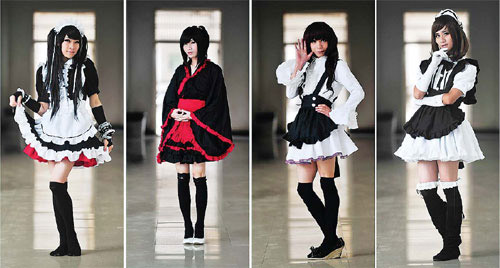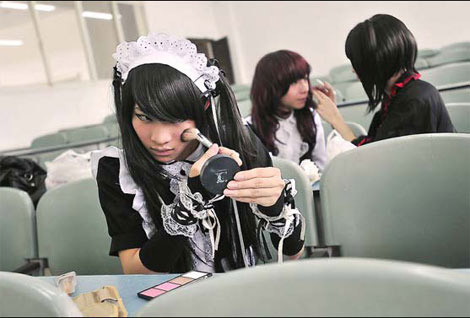Men who are princesses
 |
|
Male students from the Alice Nisemusume Association dress up as female cartoon figures for a performance. Photos by Shepherd C. Zhou / For China Daily |
 |
|
Male students from Wuhan universities apply makeup. |
Theatrical cross-dressing, a common practice in traditional Chinese opera, is now a popular trend among Wuhan undergraduates. Gan Tian reports in Beijing.
'Xiao Lu' is an undergraduate who likes to don fake long wavy blonde hair, wear colorful leggings and put on fake eyelashes. He also borrows some female garments and cosmetics from his girlfriend. Part time drag queen? Xiao Lu (his stage name, not his real name) does not want to be associated with that term. Cross-dressing is a new trend among Wuhan's undergraduates and Xiao Lu is considered as a trendsetter. He co-founded Alice Nisemusume (pseudo-girl in Japanese) Association and his favorite role is to dress up like Shihodani Yujiro's character in the Japanese manga, Princess Princess. The manga tells the story of three boys, chosen to dress up as girls, in an all-boy school.
Xiao Lu, a student from Zhongnan University for Nationalities, first dabbled in cross-dressing three years ago when he and a few friends volunteered to play the female roles in a small cartoon performance.
It was a huge success and his team attracted so many fans that they decided to form the Alice Nisemusume Association, a group where all male members play female roles.
"I just want to bring alive the beautiful cartoon characters in Japanese manga," says 20-year-old Xiao Lu, adding the association is now one of the most well-known campus groups in Wuhan, as many undergraduates are fans of nisemusume-type stories.
The association boasts 300 members from various universities in the city, including Central China Normal University, Hubei Radio and TV University and Huazhong University of Science and Technology. It has been invited to major cartoon exhibitions and talk shows throughout China. For each event, they are paid 500 yuan ($7.90) a person.
While Xiao Lu is basking in the success of his favorite pastime, his friend Liu Peng (also a stage name) is not amused by the attention.
Twenty-one-year-old Liu Peng is one of the earliest members of Alice Nisemusume Association. He said the popularity of nisemusume has attracted unwanted attention, with many conservative observers questioning the actors' masculinity. Liu Peng's mother was one of them.
"I feel very uneasy about my son's interest in dressing like a woman. His behavior will cause confusion about his values on gender and sex. That's why I've stopped him from joining such activities," Liu Peng's mother says.
Sun Yunxiao, deputy director of China Youth and Children Research Center, says pop culture like nisemusume conveys the wrong gender message to youths.
"Boys should be masculine, powerful and shoulder responsibilities. But, there are too many contradictory messages in society, like those hidden in Japanese cartoons and singing competitions," Sun says.
In 2010, Liu Zhu, a 19-year-old cross-dressing competitor, shot to fame when he participated in Hunan TV's Happy Boys, a singing contest like American Idol. The contest triggered a countrywide discussion, mostly negative, on the cross-dressing phenomenon.
It also affected Alice Nisemusume Association membership. Those who couldn't take the negative comments - quit. In autumn 2010, the association was left with only four members, prompting former association president, Liu Peng, to consider dissolving the association after Christmas that year.
But sometimes things don't turn out as planned. Liu Peng organized a birthday party at the start of 2011 and to his surprise, many young fans came and persuaded him to continue.
"I took the opportunity to recruit more members. But I also made it clear to them about the social stigma, which they need to overcome," Liu Peng says.
Not everyone is against cross-dressing. According to Li Yinhe, a well-known sociologist at the Chinese Academy of Social Sciences, the current trend is a unique expression of the performing arts.
She compares these students to Li Yugang, an attention grabbing male singer best known for his female roles.
"The popularity of cross-dressing performances show the vibrancy of performing arts. These young male students are anime fans, who like Japanese feminine cartoon figures, and they are expressing their interest through their performances. There is nothing wrong with it. It won't change their sexuality," Li Yinhe says.
Confirming Li's views, Xiao Lu says for most of his friends, it is just a passing fancy.
"We don't even aspire to make our association a profitable one. We are just a group of normal people who love Japanese cartoons, but we lead normal lives. We will stop all this cross-dressing once we've graduated," he says.






















